Iranian Lawyers Slam Morality Police Over Hijab Enforcement

A group of 61 lawyers has issued a condemnation of the morality police's aggressive tactics in Iran, particularly criticizing the controversial Nour project to enforce hijab.

A group of 61 lawyers has issued a condemnation of the morality police's aggressive tactics in Iran, particularly criticizing the controversial Nour project to enforce hijab.
Nour, the regime’s new hijab enforcement plan, has seen Iranian authorities escalate their physical efforts to enforce the Islamic Republic’s strict hijab laws. It has led to a surge in violent crackdowns targeting women on Iranian streets.
The lawyers declared such actions illegal and in violation of both the national constitution and international human rights agreements.
"Continuing these policies will undoubtedly lead to more conflict, confrontation, and insecurity in society, and will create more harmful aspects for women," read the statement.
Despite the government's efforts to enforce mandatory hijab laws, a strong wave of civil disobedience continues. Many women have been seen in public spaces without a hijab, protesting against these impositions.
Contrasting with this criticism, Grand Ayatollah Naser Makarem Shirazi sent a supportive message to Ahmadreza Radan, Iran’s Police Chief, encouraging him to enforce the hijab laws with "strength and determination." Radan echoed the sentiment, emphasizing the perceived threat if such moves are not upheld: "If the enemy overcomes the trench of chastity and hijab, nothing will remain for us."
Recent crackdowns, initiated following a directive by Supreme Leader Ali Khamenei on April 13, have led to the arrest of hundreds of women across various cities in Iran. Yet, the spirit of resistance among Iranian women remains strong. In one notable incident, a woman was arrested at the Beheshti judicial complex in Tehran for appearing without a hijab, stating, "I have come here with hijab all my life; this time I came without a hijab to reclaim my rights."
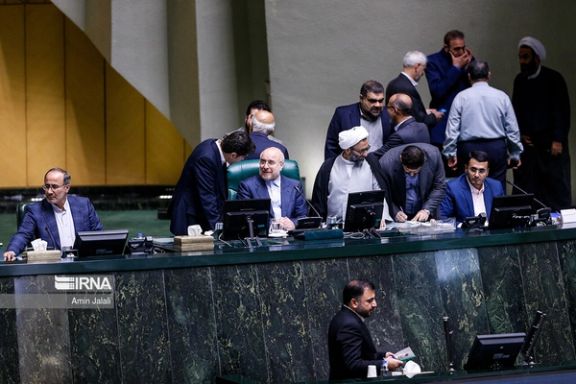
The Iranian government and its ultra-hardliner supporters advocate adding Thursdays as the second official weekend day, allegedly to avoid the Jewish Sabbath.
Currently, Friday is the only official day of rest in Iran, but many government offices and private companies also observe part-time or complete closures on Thursdays. A bill submitted to parliament last year aims to shorten the weekly work hours from 44 to 40 and will be debated in the parliament in the coming days.
Some lawmakers such as Ali-Asghar Anabestani say the parliament’s Social Committee which has reviewed the bill has been convinced by the representatives of the public institutions, including chambers of commerce, that Saturday is a better option than Thursday as the second week end day, but its advisory decision may be overturned by more hardliner lawmakers when it comes to a vote.
President Ebrahim Raisi’s parliamentary deputy, Mohammad Hosseini, said Wednesday that the government is in favor of the Thursday option.
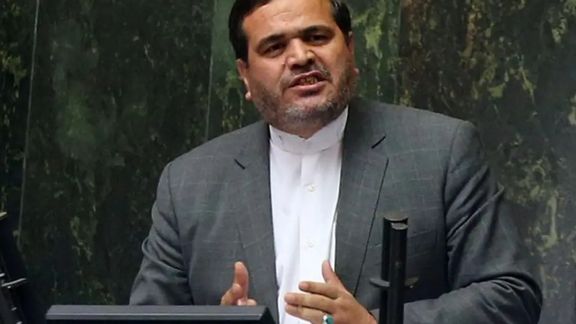
Many in Iran's private sector and others, however, say this will entail very negative consequences for Iran's foreign trade, tourism, and international relations because the workdays shared between Iran and the rest of the world will be down from Monday to Wednesday, leading to four consecutive days of no contact, if Thursday is approved.
They also argue that weekends in other Islamic countries in the region including Saudi Arabia, the UAE, Pakistan, Turkey, and Iraq is also on Friday and Saturday.
The arguments forwarded by government officials and supporters against Saturday make no reference to undesirability of having a rest day that is reminder of the Jewish Sabbath, but some private sector officials and media have disclosed that their objections are essentially ideological rather than practical or cultural as they claim.
“In various and numerous meetings with lawmakers…representatives of the chamber have pointed out the damage and erroneousness of designating Thursday as a weekend day … Their only argument against what we want is that Saturday is a Jewish day of rest!!!!” Ali Kolahi, Chairman of the Industries Committee of the Iran Chamber of Commerce posted on X on April 15.
Ideological hardliners dominating the parliament and the government have well-documented anti-Jewish and anti-Israeli positions. The Islamic Republic’s ruling regime has spent tens of billions of dollars through the past four decades to create and support anti-Israeli groups and campaigns in the region and across the world.
Those who object to designating Saturday as a day of rest cannot refute the arguments of businesspeople, an editorial by the reformist Ham-Mihan this week said. “The problem lies elsewhere, meaning that for millennia Saturday has been known as a Jewish rest day like Friday for Muslims or Sundays for the Christian,” the editorial said.
Amir-Hossein Hosseini, a businessman with hardline views, too, referred to such considerations in a tweet. Designating Saturday as a weekend day is like a “cultural, economic, religious, and social surgery” that only serves the interests of a “few members of the Chamber of Commerce”, he said while accusing them of harboring “anti-religious” thoughts.
The private sector has tried lobbying with top Shia clerics who can issue guidance in such matters to confirm that Thursday is not religiously significant or sacred like Friday and the chairman of Iran Chamber of Commerce, Samad Hassanzadeh in a letter on April 17 even appealed to Supreme Leader Ali Khamenei to support the private sector’s position.
Those in favor of Saturdays have also argued that private sector trade companies may decide to emigrate to other countries such as the UAE or Oman to facilitate their activities if Thursday is approved.
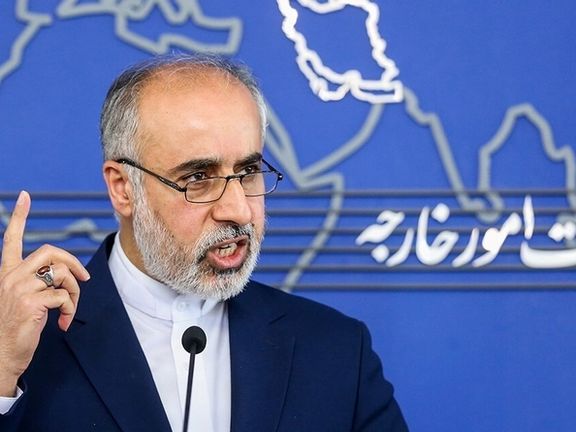
Iran has issued a condemnation of new sanctions imposed by the United States, the United Kingdom, and Canada against several Iranians and companies following Iran's military actions against Israel this month.
Nasser Kanaani, the spokesperson for the Foreign Ministry, criticized the measures and the concurrent resolution passed by the European Parliament which criticizes Iran's actions and calls for increased sanctions.
Kanaani accused several European countries of aligning with what he described as the "cruel policies" of the US government.
They followed an unprecedented Iranian attack on Israel when Tehran sent 350 plus drones and missiles towards Israel, mostly intercepted by Israel and a US-led coalition. Tehran said the attack was retaliation for an alleged Israeli strike on the Iranian consulate in Damascus.
The recent sanctions target more than a dozen entities, individuals, and vessels linked to Iran’s efforts in advancing its unmanned aerial vehicles (UAVs) capabilities, which the US Treasury Department says supports Iran's military engagements, including actions in Ukraine and against Israel.
Brian Nelson, the Treasury’s Under Secretary for Terrorism and Financial Intelligence, highlighted the destabilizing role of Iran's Ministry of Defense, accusing it of aiding hostile activities across the region and beyond.
Furthermore, the European Parliament's resolution also pushes for the designation of Iran's Islamic Revolutionary Guard Corps (IRGC) as a terrorist organization, citing long standing concerns over Iran's malign activities. The resolution calls on EU Foreign Policy Chief Josep Borrell and the EU Council to consider similar designations for Hezbollah, Iran's proxy in Lebanon, the biggest and wealthiest of Tehran's regional terror groups.
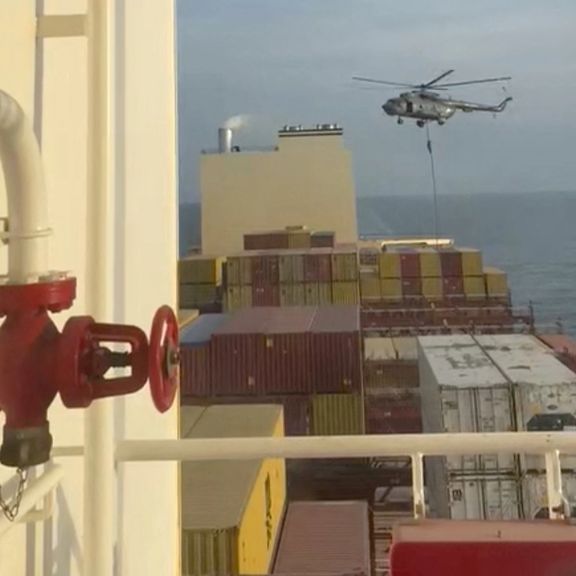
Iran's Foreign Minister announced that the crew of the Portuguese-flagged ship MSC Aries has been granted consular access and is expected to be released soon.
The announcement by Hossein Amir-Abdollahian came during a telephone conversation with Portuguese Foreign Minister Paulo Rangel, as reported by the Iranian Foreign Ministry website on Saturday.
Amir-Abdollahian said that the crew would be turned over to their ambassadors in Tehran, though no specific timeline for the action was provided. Crew members hail from countries including India, Pakistan, Russia, the Philippines and Estonia.
The Iranian foreign ministry has accused the MSC Aries of "violating maritime laws" and maintains that the ship has links to Israel. The vessel is leased by MSC from Gortal Shipping, an affiliate of Zodiac Maritime, which is partly owned by Israeli businessman Eyal Ofer.
The MSC Aries, carrying a crew of 25, was seized by Iran's Revolutionary Guards in the Strait of Hormuz, on April 13, the same day that Iran launched its first direct attack on Israel, with an aerial bombardment of 350 drones and missiles towards the Jewish state.
It followed a suspected Israeli airstrike on its consulate in Damascus on April 1 which resulted in the death of a senior Quds Force commander and the deaths of several members of the Islamic Revolutionary Guard Corps (IRGC).
The hijacking coincides with the Iran-backed Houthis' Red Sea blockade which began in November. A crew of 25 on the Galaxy Leader after its hijacking which saw commandos take over the ship in a multi-faceted operation from air and sea. The crew are still being held captive by the Yemeni group whose blockade aims to force a ceasefire on Israel.
Started as a campaign against Israeli shipping, instigated by Iran's supreme leader, it has since expanded to global shipping, seeing 50 percent of shipping on the major trade route now re-routing via Africa.
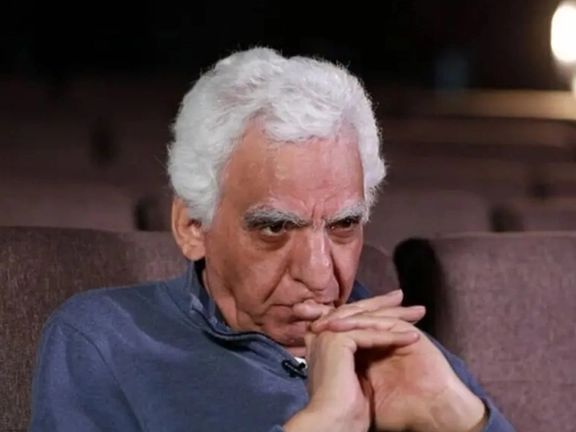
Veteran Iranian filmmaker Kyumars Pour-Ahmad did not commit suicide as the Iranian government has claimed, her daughter has said in an interview this weekend.
Initially, it had been reported in April last year that Pour-Ahmad died from heart failure, but soon after, officials announced the 74-year-old had taken his own life.
Mehdi Fallahmiri, the prosecutor in Gilan Province, who at first dispatched a murder investigation team to inquire about Pour-Ahmad's death, ruled the death was suicide. However, he later said "further investigation" is needed. But there hasn't been an update since last year.
Turan Pour-Ahmad, the director's sister, wrote in an Instagram post on the first anniversary of his death in early April, "First they tortured my brother, then they hanged his dead body."
Later on, Pegah Pour-Ahmad, the daughter of the director and screenwriter, said in an interview with Etemad newspaper on Saturday: "What my aunt said is true. But we won't discuss the case details until the right time comes. My father knew what they were going to do to him. To say that he killed himself is not true."
Last year, Mehdi Kouhian, a lawyer involved in the legal cases of artists detained during the nationwide protests which began in 2022, warned that the unrest and subsequent crackdowns on the cultural community would have a terrible impact on Pour-Ahmad's fate.
Just days before his death, Pour-Ahmad publicly appealed to the community of artists, asking that they help those who were being persecuted by the government by providing secure therapy services.
Pour-Ahmad's death had already been labeled as "government murder." Journalist Noushabeh Amiri, who is now in Europe, tweeted: “Pour-Ahmad was killed by the filthy Islamic Republic, yes, killed.”
In the protests following the death in custody of Mahsa Amini, more than 550 protesters were killed by security forces. Artists who publicly supported the protesters were arrested and given the likes of travel bans, property confiscations and pay and bank account freezes.
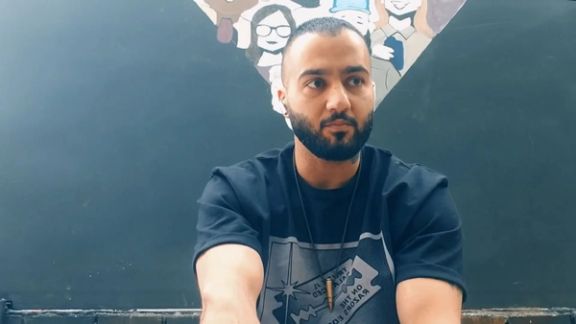
A group of high profile political prisoners in Iran have denounced the death sentence handed down to dissident rapper Toomaj Salehi, calling it a sign of Iran's "inhuman nature and deep corruption."
Earlier this week, an Iranian revolutionary court sentenced the outspoken artist to death for his songs supporting the nationwide protests of 2022, charges that his lawyer, Amir Raeisian, claims he had previously been acquitted of.
Among the 14 political prisoners who have voiced their concerns are Nobel laureate Narges Mohammadi, former MP and daughter to former president Faezeh Hashemi Rafsanjani, reformist politician Mostafa Tajzadeh, civil rights activist Golrokh Iraee, political activist Abdollah Momeni, and Islamic scholar Sedigheh Vasmaghi.
The group stated that the Iranian government "reacts with extreme cruelty even to protests made in the language of art." A 20-day appeal period is available to 33-year-old Salehi, dubbed "the world's bravest rapper" by Western media. According to his lawyer, he intends to appeal the decision.
The statement read, "The punishment for our silence today is the death sentence for all of us tomorrow; they will silence every voice. This absolute horror will end with the infinite power of people's resistance in these occupied streets."
Unions and artists in Iran have also raised their concerns and asked for Salehi's penalty to be reduced. Khashayar Sefidi, suspended from art school in Iran for participating in the 2022 nationwide protest, announced on Saturday that he had begun a hunger strike at Iran Music House in Tehran to protest Salehi's harsh punishment.
“I am worried for Tomaj's life. I am worried, and there is nothing I can do. I can only show my support with what I have: my body and my will. To oppose the injustice against Toomaj and others like him,” Sefidi wrote in an Instagram post on Saturday.
Fars Province Teachers Trade Union also released a statement on Friday, calling Salehi's sentence "unfair" as "the judiciary doesn't see embezzlers and thieves stealing the public funds, but they arrest artists.”
Dozens of celebrities from singers to actors have been arrested since 2022, many of whom have been banned from work, had bank accounts frozen and been given travel bans, in addition to heavy fines and even prison terms.
Asserting that "the path of legal criticism and activism" has been blocked in Iran, these trade union activists wrote: "The suppressed anger of the people may flare up in the near future, leading to more radical movements in society."
Additionally, the Khuzestan Province Teachers' Trade Union has condemned Toomaj Salehi's court as "unfounded".
Iranians in diaspora have organized rallies over the weekend across four continents, from Australia to Europe and North America to protest the death sentence.